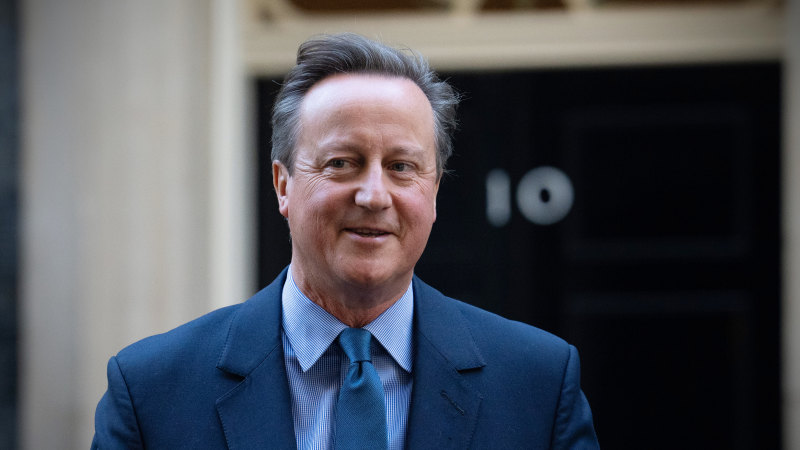Save articles for later
Add articles to your saved list and come back to them any time.
London: As political comebacks go, former British Prime Minister David Cameron’s return to government as foreign secretary is more dramatic and unexpected than most.
After unsuccessfully campaigning during the 2016 Brexit referendum for Britain to vote to “remain” in the European Union, Cameron resigned immediately and has been out of politics since.
Britain’s former prime minister, David Cameron, leaves 10 Downing Street after being appointed Foreign Secretary in a Cabinet reshuffle.Credit: Getty
He is not even a lawmaker, and his return to senior government leadership as an unelected member of Parliament’s House of Lords, though not unprecedented, is rare and has prompted concerns about accountability.
Monday’s major Cabinet reshuffle announced by Prime Minister Rishi Sunak sees Cameron joining a small club of former British premiers who have returned to government in a lesser role. Only about a dozen other former British leaders have done so since the 1700s.
Questions have been raised about Sunak’s decision given that Cameron’s legacy on Brexit and other political decisions remains deeply contentious.
A look at Cameron’s career and reactions to his comeback:
Political legacy
An Oxford-educated former public relations executive, Cameron led the Conservatives back to power in 2010 after 13 years in opposition. He led Britain for six years, and in the first of his two terms in office his party shared power with the smaller Liberal Democrats in an uneasy coalition.
Cameron was 43 when he entered No. 10 Downing Street as one of the youngest prime ministers in British history, and many observers at the time compared his youthful charisma to that of former Labour premier Tony Blair.
Like Blair he worked to steer his party toward the middle ground, championing what he called “compassionate Conservatism” in a bid to boost the Tories’ popularity.
But for many, his harsh austerity economics and his fateful decision to hold the Brexit vote remain the landmarks of his time in power, with the impact of both still reverberating in the UK.
Under Cameron, Britain’s government made deep cuts to social welfare and other public spending in healthcare and education in the aftermath of the 2008 global economic crash.
His promise to hold a referendum on EU membership, a bid to placate rebellious Conservatives and to ward off the right-wing UK Independence Party, spelled his downfall.
Cameron’s “remain” side was defeated, gaining 48 per cent of the vote compared to 52 per cent for the “leave” camp backed by Eurosceptic including former Prime Minister Boris Johnson.
UK Prime Minister Rishi Sunak.Credit: Getty
“The will of the British people is an instruction that must be delivered,” Cameron said as he resigned.
The UK left the EU in 2020 after a messy divorce, and thorny post-Brexit trade disputes continue to loom over politics in Northern Ireland.
China ‘golden era’
During his tenure, Cameron led closer economic and trade ties between Britain and China, presiding over a so-called “golden era” as he drank beer with Chinese President Xi Jinping at an English pub during a state visit.
His stance is now criticised by many in Britain as having been misguided given that Beijing’s influence is increasingly seen as a threat to international security. Last year Sunak explicitly distanced himself from Cameron’s China stance, describing it as “naïve” amid growing tensions with Beijing over Russia’s war in Ukraine.
In a statement, Cameron acknowledged he disagreed with Sunak over some decisions but stressed that he will now back Sunak as the UK heads to a general election next year.
Steve Tsang, director of the China Institute at SOAS University of London, told Reuters he did not expect the appointment to change British policy. “The ‘golden era’ remains in the history, and is not about to be resurrected,” he said.
Just a month ago, Sunak had completely distanced himself from Cameron’s government, telling his party conference he was the man to change what he described as 30 years of an inefficient “political status quo”.
That prompted Cameron himself to say the comments would fuel the view of opponents that his party could not think in the long term and that it was heading in the wrong direction.
“David Cameron was a disastrous PM. This is a last gasp act of desperation from a government devoid of talent and ideas,” said David Lammy, the foreign affairs spokesman for the main opposition Labour Party.
In 2013, Cameron suffered a foreign policy blow when his own Conservatives joined the opposition in rejecting his plans for UK military intervention against Syrian President Bashar al-Assad.
Lobbying scandal
More recently Cameron was embroiled in a scandal after revelations that he privately lobbied government officials in a bid to secure access to emergency coronavirus loans for a now-bankrupt financial services firm.
Questions about Cameron, who worked as a part-time adviser to Greensill Capital starting 2018, prompted accusations of unscrupulousness in the Conservative Party and calls for lobbying rules to be tightened.
Why Cameron, why now?
Many observers see Sunak’s move to bring back Cameron as a gamble with uncertain pay-off.
“(Sunak) is trying to look to others who might represent a smoother form of government than he’s been able to deliver,” Toby Helm, political editor of The Observer, told the BBC. But “it may look like he can’t find enough sensible people in his own party,” he said.
“Cameron will come across as a competent, appealing foreign secretary to some,” he added. “But I think the imagery that surrounds him, the impression that appointment gives, is somewhat desperate.”
Transport Secretary Mark Harper, who worked under Cameron when he was leader, was among others who praised the move, describing Cameron as a “hugely experienced” team player.
“Given the challenges facing us with the war in Ukraine (and) what’s going on in the Middle East, having a really experienced person coming in as foreign secretary, I think, is an excellent move,” Harper said.
Questions of accountability
Some also say Cameron’s accountability is in question because he is serving a top government job not as an elected lawmaker but as an appointed Lord in Parliament’s upper house. It is unusual, though not unheard of, for secretaries of state to be in the House of Lords.
In his new position, Cameron will not face regular questioning in the House of Commons as he would if he were serving in that chamber.
“Amid (an) international crisis, Sunak has chosen an unelected failure from the past who MPs cannot even hold to account,” said Labour’s Lammy.
Lindsay Hoyle, the Speaker of the Commons, said that “given the gravity of the current international situation,” he is looking into options on ensuring lawmakers can scrutinise Cameron.
AP, Reuters
Get a note directly from our foreign correspondents on what’s making headlines around the world. Sign up for the weekly What in the World newsletter here.
Most Viewed in World
From our partners
Source: Read Full Article



